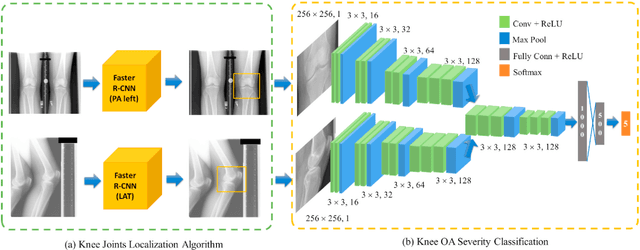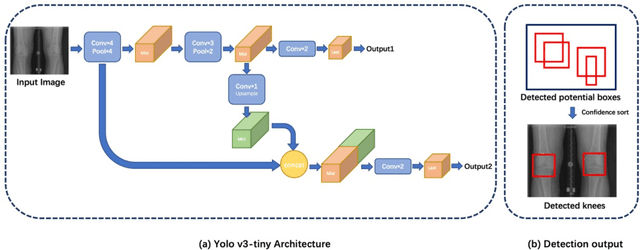Nicholas Said
Deep learning-based algorithm for assessment of knee osteoarthritis severity in radiographs matches performance of radiologists
Jul 25, 2022



Abstract:A fully-automated deep learning algorithm matched performance of radiologists in assessment of knee osteoarthritis severity in radiographs using the Kellgren-Lawrence grading system. To develop an automated deep learning-based algorithm that jointly uses Posterior-Anterior (PA) and Lateral (LAT) views of knee radiographs to assess knee osteoarthritis severity according to the Kellgren-Lawrence grading system. We used a dataset of 9739 exams from 2802 patients from Multicenter Osteoarthritis Study (MOST). The dataset was divided into a training set of 2040 patients, a validation set of 259 patients and a test set of 503 patients. A novel deep learning-based method was utilized for assessment of knee OA in two steps: (1) localization of knee joints in the images, (2) classification according to the KL grading system. Our method used both PA and LAT views as the input to the model. The scores generated by the algorithm were compared to the grades provided in the MOST dataset for the entire test set as well as grades provided by 5 radiologists at our institution for a subset of the test set. The model obtained a multi-class accuracy of 71.90% on the entire test set when compared to the ratings provided in the MOST dataset. The quadratic weighted Kappa coefficient for this set was 0.9066. The average quadratic weighted Kappa between all pairs of radiologists from our institution who took a part of study was 0.748. The average quadratic-weighted Kappa between the algorithm and the radiologists at our institution was 0.769. The proposed model performed demonstrated equivalency of KL classification to MSK radiologists, but clearly superior reproducibility. Our model also agreed with radiologists at our institution to the same extent as the radiologists with each other. The algorithm could be used to provide reproducible assessment of knee osteoarthritis severity.
Automated Grading of Radiographic Knee Osteoarthritis Severity Combined with Joint Space Narrowing
Mar 16, 2022



Abstract:The assessment of knee osteoarthritis (KOA) severity on knee X-rays is a central criteria for the use of total knee arthroplasty. However, this assessment suffers from imprecise standards and a remarkably high inter-reader variability. An algorithmic, automated assessment of KOA severity could improve overall outcomes of knee replacement procedures by increasing the appropriateness of its use. We propose a novel deep learning-based five-step algorithm to automatically grade KOA from posterior-anterior (PA) views of radiographs: (1) image preprocessing (2) localization of knees joints in the image using the YOLO v3-Tiny model, (3) initial assessment of the severity of osteoarthritis using a convolutional neural network-based classifier, (4) segmentation of the joints and calculation of the joint space narrowing (JSN), and (5), a combination of the JSN and the initial assessment to determine a final Kellgren-Lawrence (KL) score. Furthermore, by displaying the segmentation masks used to make the assessment, our algorithm demonstrates a higher degree of transparency compared to typical "black box" deep learning classifiers. We perform a comprehensive evaluation using two public datasets and one dataset from our institution, and show that our algorithm reaches state-of-the art performance. Moreover, we also collected ratings from multiple radiologists at our institution and showed that our algorithm performs at the radiologist level. The software has been made publicly available at https://github.com/MaciejMazurowski/osteoarthritis-classification.
 Add to Chrome
Add to Chrome Add to Firefox
Add to Firefox Add to Edge
Add to Edge